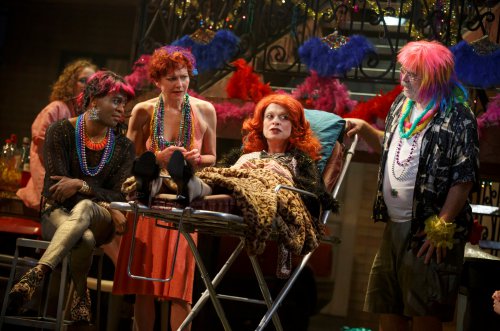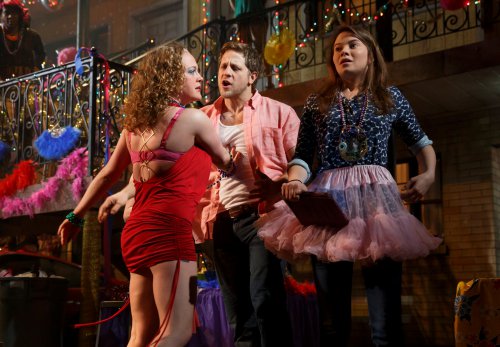Airline Highway
Colorful milieu of New Orleans motel full of low life denizens seems extremely familiar.

K. Todd Freeman, Julie White, Judith Roberts and Scott Jaeck in a scene from Lisa D’Amour’s “Airline Highway” (Photo credit: Joan Marcus)
[avatar user=”Victor Gluck” size=”96″ align=”left” ] Victor Gluck, Editor-in-Chief[/avatar] Lisa D’Amour’s Airline Highway is part of a subgenre of drama that goes back to Gorki’s The Lower Depths and continues with O’Neill’s The Iceman Cometh, Tennessee Williams’ The Mutilated and Lanford Wilson’s Balm in Gilead and The Hot L Baltimore. All of these plays deal with characters at the bottom of the social ladder, people who are just surviving by the skin of their teeth or drowning altogether, the marginalized who are looked down upon by the mainstream of society. All of these plays concern characters who are avoiding coming face to face with themselves and their problems. Manhattan Theatre Club is presenting the Steppenwolf Theatre Company’s production of Airline Highway which had its debut in Chicago earlier this season.
Unlike D’Amour’s last New York play, Detroit, a Pulitzer Prize finalist which had four characters and a tight arc, Airline Highway is diffuse and sprawling with a large cast of 16 actors ably piloted by director Joe Mantello. Set in the shabby, rundown Hummingbird Motel on New Orleans’ Airline Highway, the play introduces us to a colorful but down-and-out cast of characters just eking out a living: Krista, a now homeless stripper in her 30’s; Tanya, a 62-year-old hooker and drug addict; Terry, an African American handyman always in need of money; Francis, a 50ish poet who seemed to have missed his moment, and Sissy Nan Na, a transvestite bartender and karaoke wrangler on Bourbon Street of African American and Puerto Rican descent. The motel is managed by Wayne, in this late 50’s, always good for a soft touch or ready to tell his life story.
Aside from a typical day in the motley lives of these people, today is special: Tanya has arranged the “living funeral” for the 85-year-old Miss Ruby, the Hummingbird’s grande dame, who wants to see her sendoff before she dies. Dying in a room on the motel’s second floor, the Miss Ruby has been formerly a legendary burlesque performer in her own Bourbon Street club. The play’s climax arrives near the end of the play when Miss Ruby in a fever dream only she and we are privy to gives the denizens of the Hummingbird the advice of her life experience: “You hold the potential to teach the world something about itself. But every time you come close to embracing the mess of contradictions that makes you who you are … you throw away your chance. You let the world make you feel small and disposable. You are not disposable. You are invaluable. And you carry the ecstatic experience inside you.” However, like Hickey’s advice to the denizens of Harry Hope’s saloon, it is too little and too late to change the course of these characters’ lives.
The action of the play is propelled by the return of Bait Boy, now wanting to be called Greg, a former 30’s New Orleans bartender, bouncer and karaoke wrangler and Hummingbird resident, who has managed to escape to Atlanta and has hooked up with a rich older woman in suburban real estate. Bait Boy who has arrived to see Miss Ruby one last time has brought his step-daughter Zoe, a sheltered 16-year-old who has come with him to interview these people for a school project about a sub-culture.

Caroline Neff, Joe Tippett and Carolyn Braver in a scene from Lisa D’Amour’s “Airline Highway” (Photo credit: Joan Marcus)
Although this allows the various characters to tell Zoe their stories, it also puts a mistaken sociological twist on the play which makes it all seem like a tale of exotic creatures under a microscope. However, the unfinished business Bait Boy has is with Krista with whom he had a six year fling before he decamped for greener pastures. Unfortunately, this remains unresolved like all of the characters’ problems, as all are running away from their true selves.
While the play eventually feels both familiar and unfulfilled, the cast made up of both Chicago and New York actors create vivid characters under the assured direction of Mantello whose last two Broadway productions were also big cast shows, The Last Ship and Casa Valentina. Joining the Chicago cast, Tony Award winner Julie White makes hooker Tanya a very sympathetic character wracked with guilt from earlier decisions in her life. As the flamboyant drag queen Sissy Na Na, K. Todd Freeman steals every scene he is in. In her brief appearance at the end of the second act, Judith Roberts is memorable as the wise and knowing Miss Ruby who is the author’s spokesperson.
As the former lovers, Joe Tippett’s Bait Boy is extremely masculine as well as portraying low self-image, while Caroline Neff’s homeless Krista is a pathetic picture of fragility like one of Tennessee Williams’ doomed heroines. Carolyn Braver brings the innocence, artlessness and ingenuousness of youth to her teenage Zoe, witnessing real life for the first time. While their characters are more than a little generic, Scott Jaeck as the big-hearted manager and Tim Edward Rhoze as the impecunious handyman make strong impressions.
The most effective part of the play has been created by the expert production team. Scott Pask’s setting for the two-story dilapidated motel and parking lot with its soda machine, flashing sign and red car on blocks grounds the play in reality and gives it big scope for its action. David Zinn’s colorful costumes truly make this feel like a New Orleans Jazz funeral. The lighting by Japhy Weideman is so subtle that you will suddenly be surprised to find that night has fallen. Fitz Patton’s original music and sound designs add to the authentic feel of this community.
Lisa D’Amour’s Airline Highway is one of only two new American plays to reach the main stem this season which did not start Off Broadway. Unfortunately, her debut at this level is not a case for cheering. While the play as directed by Joe Mantello is always absorbing, its characters seem overly familiar and generic, and the play ultimately feels unfinished. Its setting of New Orleans seems arbitrary as so little is done with it. Ironically, the author is a native and longtime resident of the Crescent City.
Airline Highway (through June 14, 2015)
Manhattan Theatre Club’s presentation of Steppenwolf Theatre Company’s production
Samuel J. Friedman Theatre, 261 W. 47th Street, in Manhattan
For tickets, call 212-239-6200 or visit http://www.manhattantheatreclub.com
Running time: two hours and 15 minutes with one intermission






Leave a comment